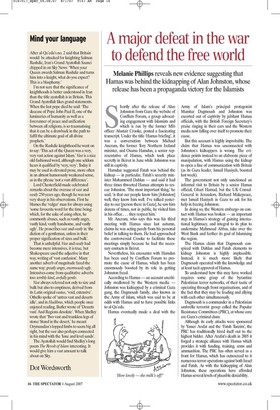Mind your language
After al-Qa'eda's no. 2 said that Britain would be attacked for knighting Salmi) Rushdie, Iran's Grand Ayatollah Saanei chipped in on Sky News: 'When your Queen awards Salmi) Rushdie and turns him into a knight, what do you expect? This is a blasphemy.'
I'm not sure that the significance of knighthoods is better understood in Iran than the title ayatollah is in Britain. This Grand Ayatollah likes grand statements. When the last pope died he said: 'The decease of Pope John Paul II, one of the luminaries of humanity as well as a forerunner of peace and unification between all religions, is so traumatising that it can be a drawback in the path to fulfil the ultimate goal of all divine prophets.'
On the Rushdie knighthood he went on to say: 'This act of the Queen was a very, very vast action against Islam.' Vast is a nice old-fashioned word, although one seldom hears it qualified by 'very, very'. Today it may be used in elevated prose, more often in an almost humorously weakened sense, as in the phrase 'not a vast difference'.
Lord Chesterfield made celebrated remarks about the overuse of vast and vastly 250 years ago, though he was not very sharp in his observations. First he blames the 'vulgar' man for always using 'some favourite word for the time being; which, for the sake of using often, he commonly abuses, such as vastly angry, vastly kind, vastly handsome, and vastly ugly'. He proscribes vast and vastly in `the diction of a gentleman, unless in their proper signification of sizes and bulk'.
That is unhelpful. Vast and vastly had become mere intensives, it is true, but Shakespeare used the adjective in that way, writing of 'vast confusion'. Many another adverb of magnitude fared the same way: greatly angry, enormously ugly. Intensives come from qualitative adverbs too: terribly kind, awfully gentle.
Vast always referred not only to size and bulk but also to emptiness, derived from its Latin original vastus, 'void, extensive'. Othello spoke of `antres vast and desarts idle', and in Hudibras, which people once enjoyed reading, Butler wrote of Desarts vast/ And Regions desolate'. When Shelley wrote that Two vast and trunldess legs of stone/ Stand in the desert,' he meant Ozymandias's lopped limbs to seem big all right, but the vast also perhaps connected in his mind with the 'lone and level sands'.
The Ayatollah would find Shelley's long poem The Revolt of Islam interesting. It would give him a vast amount to talk about on Sky.
Dot Wordsworth








































 Previous page
Previous page